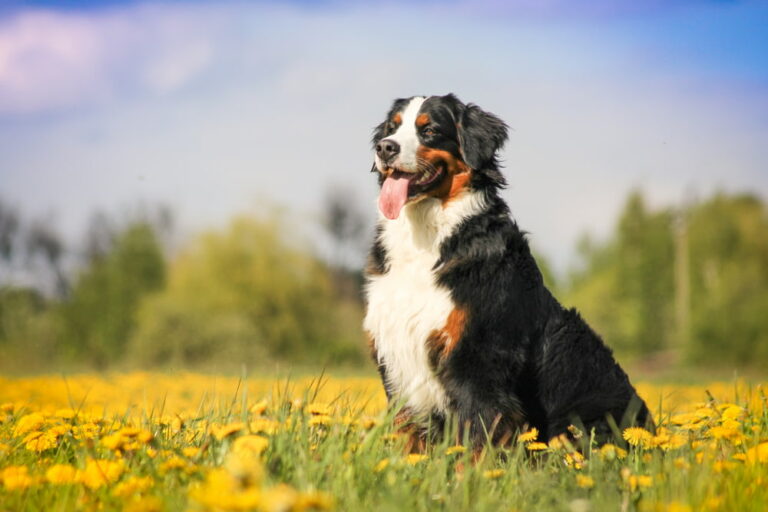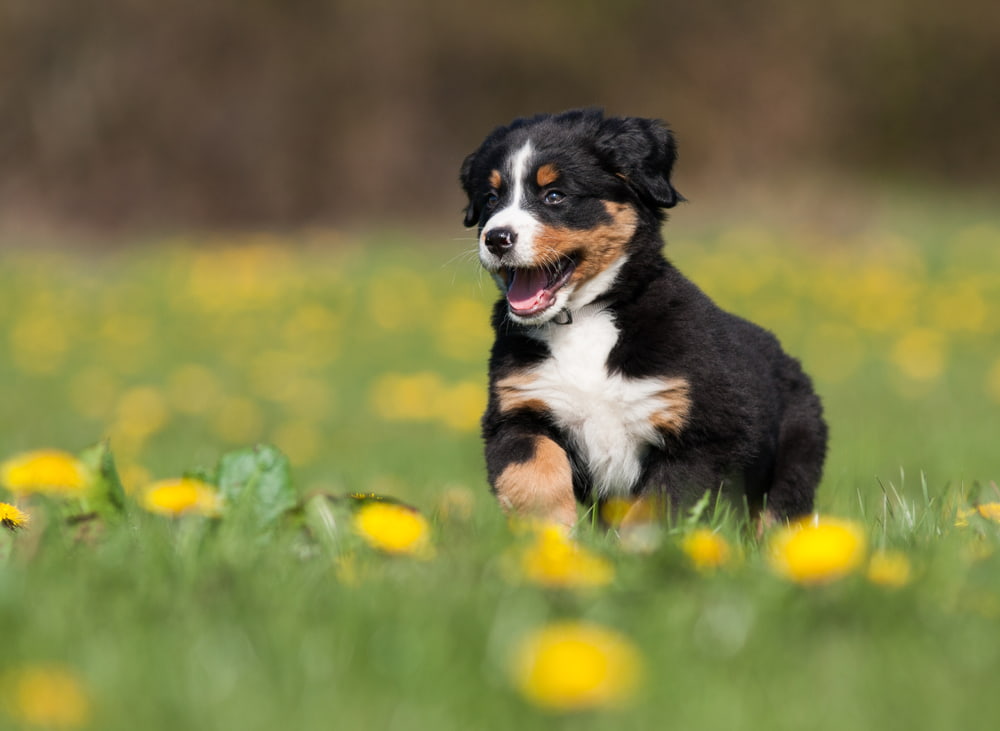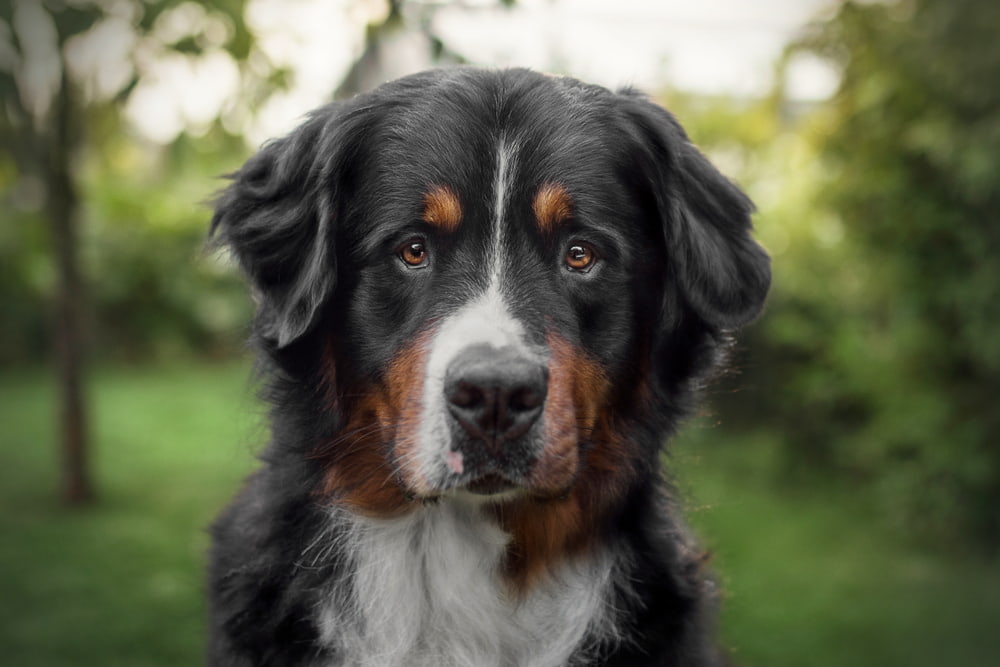Bernese Mountain Dog

Breed Details
- Average Height: 23 to 27.5 inches
- Average Weight: 70 to 115 pounds
- Coloring: Tri-color (black, rust and white or black, tan and white)
- Coat Type: Thick coats, wavy or straight, moderately long fur
- Dog Breed Group: Working group
- Average Lifespan: 7 to 10 years
- Key Personality Traits: Hardworking, calm, good-natured, affectionate
In 1991, Jennifer Zaayer attended a dog show in Denver to check out the Rottweilers and Newfoundlands in the hopes of finding the right dog to add to her family. Her plans changed the moment she saw a Bernese Mountain Dog.
“I’d never heard of Bernese Mountain Dogs before,” she recalls. “Just seeing the dog, we knew it was what we wanted.”
Although Zaayer, a breed ambassador for the Bernese Mountain Dog Club of America and vice president of the Southern California chapter, was initially drawn to the adorable appearance of the large, tri-colored dogs, it was their sweet personalities that made her fall in love with the breed.
“They are such sensitive dogs and really connect with people,” she says. “They are really good family dogs.”
History and Origin

As their name suggests, Bernese Mountain Dogs hail from the mountains of Bern, Switzerland.
Thanks to their muscular builds and impressive strength, the dogs drove cattle and guarded farms, patrolling rugged terrain across expansive swaths of land. Bernese Mountain Dogs are perhaps best known as a drafting breed, able to pull carts filled with heavy loads.
Their reputation as excellent working dogs captured the interest of a farmer in Kansas who is credited with bringing the breed to the United States. He imported two Bernese Mountain Dogs to work on his farm and the breed was an instant hit. The American Kennel Club recognized the breed in 1937.
Bernese Mountain Dog Physical Characteristics

Bernese Mountain Dogs are powerful working dogs. Measuring 23 to 27.5 inches tall at the shoulders and weighing between 70 and 115 pounds, Bernese are adorable puppies that turn into strong, imposing—and just as adorable—adults. But their size is sometimes overwhelming.
“A lot of people who adopt these large-breed dogs have wonderful intentions but the adorable puppies turn into 100-pound teenagers,” explains Tonia Moore, co-founder of the Bernese Mountain Dog rescue, BFW Rescue. “Large breeds are slower to mature so they are still exuberant puppies at 3 years old.”
The tri-colored dogs are black with distinctive rust (or tan) and white markings. These dogs tend to have rust-colored patches over each eye, on the cheeks, either side of the chest, all four legs and under the tail. White markings appear as a muzzle band, the tip of the tail, feet and on the chest.
Bernese Mountain Dogs have thick double coats that make them well-suited to cold temperatures.
Bernese Mountain Dog Temperament

As working dogs, Bernese Mountain Dogs were prized for being alert, confident, and eager to please. Those same traits—along with their good-natured dispositions and deep sense of affection and loyalty—have made this dog breed a popular family pet. Bernese Mountain Dogs are known for being gentle with children.
Since Bernese develop strong bonds with their owners, they prefer not to be left alone for long periods, Zaayer says.
Socialization is important. In fact, Moore believes failing to socialize these gentle giants is one of the biggest mistakes Bernese owners make.
“A lot of owners start strong and stop,” she explains. “The more you expose them to different sights, sounds, smells, and experiences, the more confident and comfortable and less shy and fearful they become.”
Although Bernese Mountain Dogs can be aloof with strangers, the breed is not aggressive. Berge notes that they tend to have minimal prey drive, making them well-suited to homes with other pets, including cats.
Bernese Mountain Dogs make great watch dogs that will bark if something is amiss but these are true gentle giants that, despite their size, have no guarding tendencies.
“They won’t go after someone, but their size and barking are often enough to scare them off,” Zaayer adds.
Bernese Mountain Dog Care Guide

There are two big downsides to the Bernese Mountain Dog breed, according to longtime Bernese Mountain Dog owner Dr. Kathy Berge, veterinarian and medical director for All-Pets Hospital in Des Moines, Iowa: The breed sheds and is prone to numerous health issues that shorten their lifespan.
Read on to learn more about Bernese Mountain Dog care.
Diet and Nutrition
Bernese dogs, like all breeds, benefit from high quality diets. Due to their risk of orthopedic issues, Berge notes that it’s essential not to over-feed Bernese Mountain Dogs to keep their weight in check.
Exercise and Activity
These working dogs are happiest with something to do. Regular walks—with lots of chances to sniff and explore—provide important mental and physical stimulation.
“A lot of people think that, because of their size, they need a house with 100 acres to roam but they are great apartment dogs,” Moore says. “They like to be active but, most of all, Berners want to be with their people.”
Bernese Mountain Dogs also love learning new tricks, practicing commands, pulling carts or participating in search and rescue. They are a sensitive breed so Zaayer suggests training that prioritizes positive reinforcement and rewards.
Bernese Mountain Dogs thrive in cold climates and love a good romp in the snow. In warm climates, Moore suggests scheduling walks in the morning or evening before it gets too hot and watch for signs of heat stroke, including excessive panting, disorientation, vomiting, diarrhea, or bright red gums.
Grooming and Nail Care
Bernese Mountain Dogs are heavy shedders. Berge suggests brushing them at least twice per week to remove excess hair. Zaayer uses a grooming rake to remove the undercoat. Their nails should be trimmed regularly to prevent painful overgrowth. The breed doesn’t require professional grooming.
Bernese Mountain Dog Health Issues

As a giant breed, Bernese Mountain Dogs are prone to several common health problems.
Hip dysplasia and elbow dysplasia: Dysplasia is diagnosed when the hip or elbow joints fail to align with the sockets. The symptoms include pain, stiffness, altered gait, and potential lameness. Berge suggests asking breeders to provide the Orthopedic Foundation for Animals (OFA) certifications for the parents to reduce the odds that Bernese puppies will have orthopedic issues.
Bloat: Also known as gastric torsion, bloat occurs when the stomach fills with food, fluid, or gas, causing it to stretch, cutting off circulation to the heart and stomach. Bloat causes tissue death and can be fatal.
Histiocytic sarcoma: The cancer, uncommon in other breeds, often affects Berners. It’s a cancer of the blood cells that starts in the spleen or liver and spreads to other organs. The prognosis is poor. Berge notes that most Bernese Mountain Dogs live just a few months after a diagnosis.
Interesting Bernese Mountain Dog Facts

In their native Switzerland, Bernese Mountain Dogs are known as Berner Sennenhund.
Swiss farmers sometimes referred to Bernese dogs as “Cheese Dogs” because they would be responsible for pulling carts of dairy products like milk and cheese.
Celebrities like Kate Hudson, Chelsea Handler, and Hilary Duff all share their lives with Bernese Mountain Dogs.
A Bernese Mountain Dog named Luna (@luna.the.berner) has more than 112,000 Instagram followers.
Popular Bernese Mountain Dog Mixes

Bernese Mountain Dogs have a reputation for being calm, intelligent, and affectionate so it’s no surprise that these dogs are often mixed with other breeds.
Some of the most common breeds mixed with Bernese Mountain Dogs include:
- Bernedoodle (Bernese Mountain Dog and Poodle)
- Labernese (Bernese Mountain Dog and Labrador Retriever)
- Saint Bernese (Bernese Mountain Dog and Saint Bernard)
- Bernsky (Bernese Mountain Dog and Husky)
- Bernese Shepherd (Bernese Mountain Dog and German Shepherd)
Bernese Mountain Dog Adoption Tips

A Google search for “Bernese Mountain Dog rescue” will turn up information for rescues from coast to coast that specialize in finding forever homes for purebred and mixed-breed Bernese Mountain Dogs.
While breed-specific rescues like NORCAL Bernese Mountain Dog Rescue; Gentle Giants Rescue and Adoptions; and Berner INC Education and Rescue; specialize in finding forever homes for rescued Bernese Mountain Dogs, most work with small numbers of dogs. At BFW Rescue Inc., which has a network of foster homes in all 50 states, fewer than 20 Berners end up in rescue every year.
“Although their numbers are growing, it’s not like a German Shepherd or Golden Retriever or Labrador Retriever that most people have seen or played with,” Moore says. “The breed is still unknown to a lot of people.”
There are still Bernese Mountain Dogs available for adoption but finding one might take time. The Bernese Mountain Dog Club of America, a national breed organization, has a committee that focuses on helping with rescue and rehoming situations and the website PetFinder allows you to search by breed and area to help you find a Bernese Mountain Dog close to home.
Keep in mind that if you’re interested in adopting a purebred Bernese Mountain Dog, it may take some time to find one. Otherwise, finding a reputable dog breeder and purchasing a Bernese may be a faster way to find your new canine friend. Just make sure to do your research, ask questions, and talk to references before purchasing a Bernese from a breeding kennel or facility.
Bernese Mountain Dog FAQs

Bernese Mountain Dogs have lots to offer families. Their fun-loving personalities, docile natures, and sweet smiles are definitely something special. But before welcoming a Bernese into your home, it’s important to know exactly what you’re getting into.
Here are some frequently asked questions about the breed.
Do Bernese Mountain Dogs Shed?
Yes! Bernese Mountain Dogs do shed quite a bit. They have thick double coats and the breed “blows their coats” twice a year, creating even more dog hair than usual. Regular brushing can help remove excess hair but expect to find tufts of hair on clothes, furniture, and the floors.
Do Bernese Mountain Dogs Drool?
No. In fact, Zaayer notes that it’s considered a fault in the breed to have “loose lips” that cause dogs to drool. “It’s considered a dry mouth breed,” she adds, meaning that this dog breed produces less drool than some others.
Are Bernese Mountain Dogs Hypoallergenic?
No, this is not a hypoallergenic breed. Some Bernese mixes, such as the Bernedoodle, may produce less dander based on the other breed they are mixed with. Since Poodles produce low dander, Bernedoodles may be better suited for those with allergies. However, no dog is truly hypoallergenic.
Do Bernese Mountain Dogs Swim?
Sometimes. It’s not a water breed like a Labrador Retriever or Irish Water Spaniel but some Bernese Mountain Dogs will take to the water, wading or even swimming.
Where Are Bernese Mountain Dogs From?
The breed hails from the mountainous regions of Bern, Switzerland.
Bernese Mountain Dogs Pictures
There’s no denying that this dog breed is adorable. Browse our gallery to see Bernese Mountain Dog photos showcasing all seasons and situations.


























